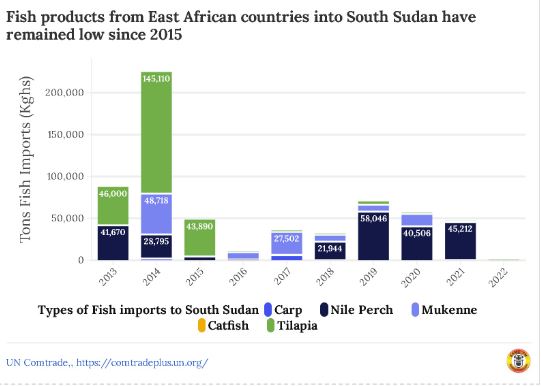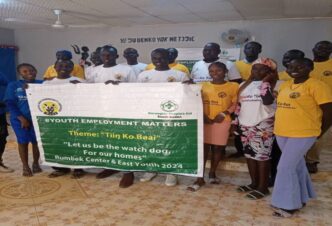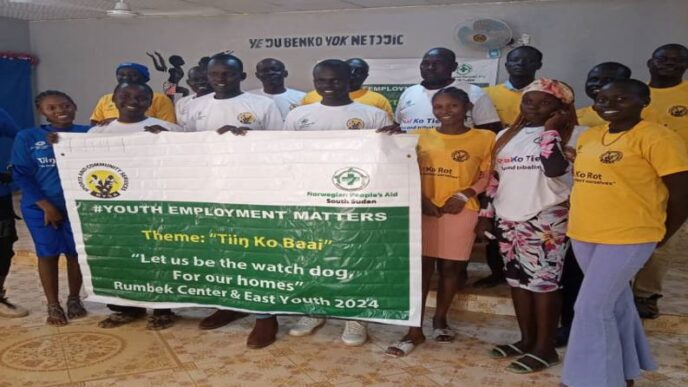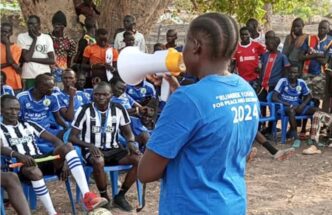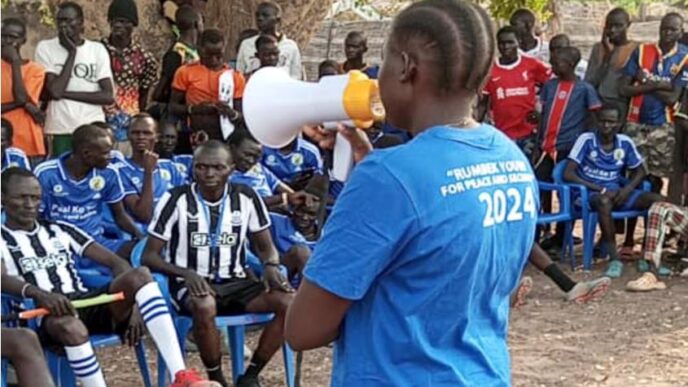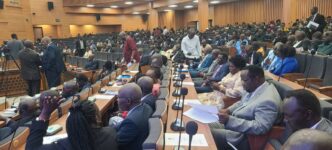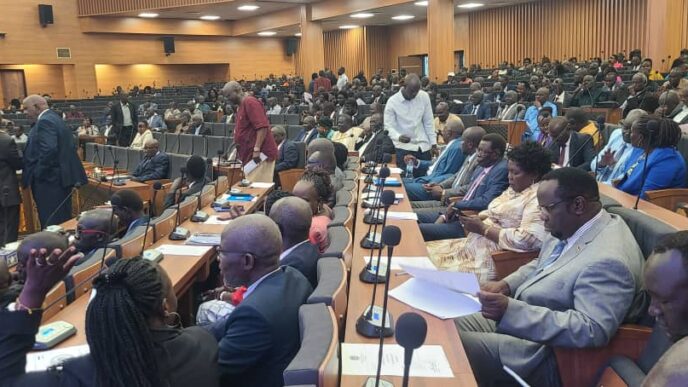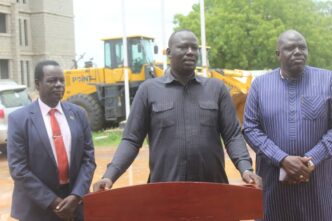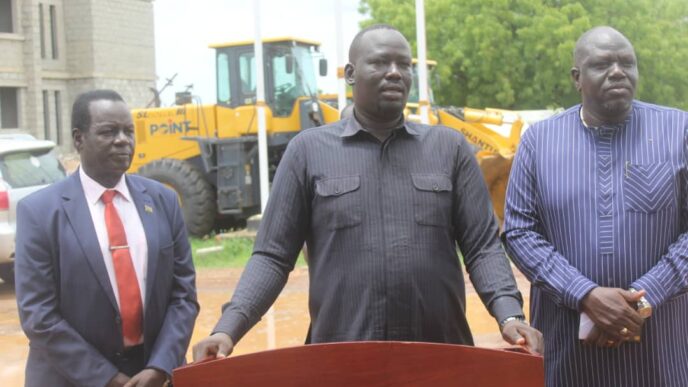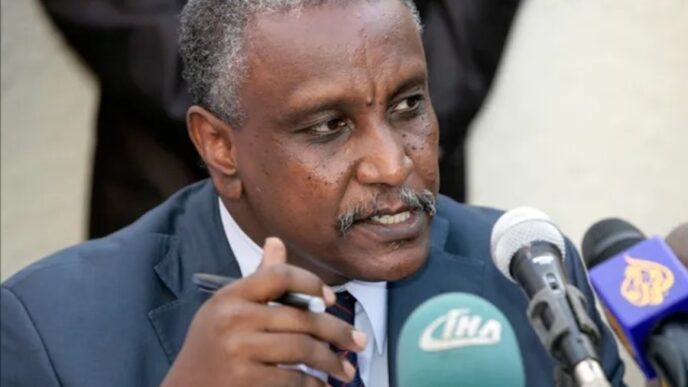[ad_1]
The fishing industry in South Sudan and its exports to neighbouring countries in East Africa are growing considerably, despite a lack of policies and enforcement that is aggregating illegal and unregulated fishing practices in the country.
For years, the majority of South Sudanese fishermen have used traditional fishing methods that are less productive and often harmful to the ecosystem, such as spears, bows and arrows, fish barriers, traps, baskets, artificial reefs and local canoes called murkab in Juba Arabic.
However, since the comprehensive peace agreement that ended the long civil war between northern and southern Sudan in 2006, the country has recorded a significant increase in fish production and exports, while fish imports to the country have steadily declined.
The director general of the National Ministry of Animal Resources and Fisheries, Jackson Muso, said last year, South Sudan produced about 200,000 metric tons of fish.
This production is expected to rise to between 300,000-400,000 tons of fish per year by 2025, according to Muso. This includes an estimated 100,000-150,000 tons of fish from aquaculture, which is the breeding, rearing, and harvesting of fish in controlled conditions.
These estimates are based on management theory, where scientists calculate the surface areas of water bodies to determine the potential yield per hectare.
Muso said there are several factors that have contributed to the drastic development of fishing production in the country. These include the development of road infrastructure, as well as increasing security after South Sudan’s civil war ended in 2018.
“We can see the road between Juba and Bor is developed; we can see an increase in market production,” he said.
“The flood increases fish propagation, and therefore productivity of fish increases as floods increase, so we are witnessing an increase in fish production… Another factor leading to production is peace and security in some of the states.”
The White Nile River, which flows through the country, supplies major wetland and water resources for fish in South Sudan. The enormous Sudd swamp is the most significant breeding space for Nile ecosystem fish species and is the largest potential source of freshwater for fish in South Sudan.
South Sudan is among the Nile Basin Countries with 100 fish species, most of these species are reported from wetland areas. The bulk of the catches come from Nile tilapia, locally known as bulti, atuur, ruoth, and kpakaru; Nile perch, locally known as dabs, chal nganzi; African catfish, locally known as garmut, reec, chol, pet, and mangani; and other catfishes, according to FAO.

Fish export market growing
Most fishing activities in the country are still for subsistence consumption and are sold in local markets. However, since 2019, exports to nearby countries such as the Democratic Republic of the Congo (DRC) and Uganda have steadily increased.
Currently, South Sudan is exporting a huge number of fish to Kasindi in the DRC and to Arua in northern Uganda, but the exact quantity exported is not established.
According to global trade data platform UN Comtrade, Uganda’s fish imports from South Sudan have increased from almost zero to about 1 million kilograms between 2017 and 2021.
At the same time, while Uganda exported, 177000 kilograms of fish to South Sudan in 2013, its exports to the young country have steadily dropped to just 54,000 kilograms in 2021.
South Sudan’s exports are not recorded in this system, nor are DRC’s imports.

However, Esther Deng, a South Sudanese businesswoman in Bor town, said South Sudanese traders face immense challenges from higher fishing competition from Kenya and Uganda, which supply huge numbers of fish to the same markets.
“The problem we are having in the market is that the fish we make in South Sudan is not the only fish in the market. We have Kenyan, Tanzania and Uganda fish; we take them to the same market; there are a lot of fish,” she said. “If we have a good system of selling our fish, it can help us as an entire country, and it can bring a lot to the state where we produced it. There is no proper way of selling the fish.”

Deng said the fishers lack enough skills and updated fishing gears that can help them catch enough for export. Most fishers use traditional methods mostly used for subsistence catches.
“The fish we take to the market is not as good as the one which is from Kenya, Uganda, and Tanzania,” she said. “Because most of our fishermen are not trained; they don’t have the tools; they don’t have enough knowledge to process fish, but in other countries the fishers are taught how to fish. Our fish is the last product in the market, [but] if we do well and train our people, we can have the best product in the market.”
Exports to the international or regional market are also challenged by high taxes collected by the South Sudan taxation authority at the border, along with other fees paid to other actors along the supply chain, Deng said.
“The taxation in South Sudan is becoming too much, and the people loading are foreigners – we pay them USD $280 dollars per bundle, plus other charges. At the end, we find ourselves getting nothing,” she said. “At least the government should help reduce the taxation rate. We will appreciate and will be happy about that because the charges are too much.”
The National Minister of Fisheries and Animal Resources, Hon. Oyoti Adigo, said illegal tax collectors and other actors are taking money from fishers, which is not in line with the country’s financial policy. These include various armed groups who establish roadblocks and collect small amounts of money from drivers.
Adigo said the country’s financial policy goes through the Ministry of Finance to the Council of Ministers and the Parliament and is finally signed by the president.
The South Sudan Taxation Amendment Act 2016 is very clear on the percentage that should be taxed on the imported and exported goods. Section 87 of chapter one of the taxation act says goods special food items entering South Sudan are taxed at 2% and 18% on the exported goods.
“People talk about taxes; these are illegal taxes; they are illegal checkpoints; they have nothing to do with the government. The government taxes people according to the financial acts,” he said.
In 2021, the National Revenue Authority created a new financial system and policies around taxation to collect revenue from traders. This included creating an e-tax platform to promote productivity, accountability and compliance while ensuring legal and safety standard customs collection from the inflow and outflow of goods.
But yet traders continue to complain over multiple taxations by different authorities, including the City Council, Taxation Authority and others.
According to Daniel Kumbotio, a South Sudanese fish trader who has been exporting fish to Democratic Republic of Congo for three years, local traders often travel from Bor via Juba through Baze to Ariwara Road.
“We come via Juba to Yei, Bazie and cross to Ariwara. Sometimes we escape the police stations and use the shortcut because the police have a lot of issues. We use motorbikes to escape and sometimes we move at nights when all police are not there. It’s difficult to dodge the police station but we have to use our mind; we dodge the charges put on us,” he said.
According to NilePost in February 2024, the Ugandan state minister of fisheries, Hellen Adoa, raised a concern over the increasing importation of illegal fish from South Sudan to Uganda via Nimule, through the Elegu border. But South Sudan is yet to officially report any illegal exportation of fish to any neighboring countries.
Lack of national regulatory policies
The young fisheries sector in South Sudan is still facing challenges to develop due to a lack of policies that can help in regulating activities.
Most fishermen use outdated fishing methods that result in high post-harvest losses of fish.
Since South Sudan’s independence from Sudan in 2011, the country has yet to develop its own policies to regulate some sectors. There is no proper regulation that controls the usage of the natural resources in the country, though the transitional Constitution of the Republic of South Sudan aims to secure “ecologically sustainable development and the use of natural resources while promoting rational economic and social development to protect genetic stability and biodiversity.”
The country’s constitution is the overarching legal document that places emphasis on the sustainable use of natural resources, wise environmental management and involvement of local communities in decision making on the exploitation of natural resources in their areas. The constitution also gives significant powers to the states and local county authorities to manage their natural resources including water bodies such as lakes and rivers.
However, the constitution does not include any specific controls on the numbers of fishers or the entry or export of fish. Thus there is no national monitoring, control and surveillance mechanism for fisheries management in place, which results in wide illegal, unregulated and unreported fishing.
According to the Director General (DG) Central Equatoria State Ministry of Animal Resources, Fisheries and Tourism, Mr. Khamis Juma Aganasi, the ministry is partly working with the 1954 Sudan Fisheries Law, though it’s outdated.
Khamis said the ministry is still developing a new policy.
“Regulation of fisheries, we are supposed to have a fisheries bill; it’s not yet passed. At the moment, the ministry is in the process of developing a policy for animal resources, fisheries and tourism. It has to be enacted by the parliament, but [right now] we are working with the old one of Sudan,” he said.
Khamis said the ministry only issues operational fishing licenses, but the lack of a fisheries bill creates a big challenge to the ministry’s operation.
“Some [fishers] are coming and we are issuing those fisheries licenses. Working without a license is not good. We give them [a license] from January to December each year. If the laws are there, the ministry will have the mandate to give them the pressure. The government is supposed to support us by passing our fisheries bill, so that at the end of the day we have to regulate our activities,” he said.
According to the country’s draft National Fisheries Policy 2012-2016, the main goal for fisheries is to develop the aquaculture sector to contribute to economic growth, poverty alleviation and food security. This must be done by creating an enabling environment to attract private investment and funding for the development of integrated agriculture in rural areas.
Without policies, it is difficult for the police and other fisheries authorities to arrest and convict any person conducting illegal fishing activities. The local police officer in Bor town, Jonglei state, who asked not to be named by name because he is not authorized to talk to the media, said the police desk has not arrested or apprehended any case or violation committed by fishers in Bor landing site.
“No one has reported any [fish-related] case to our desk since we started working here,” he said. “The only cases we solve here are the migration, theft and fighting among the people coming here. They report for us; we investigate the matter and send it to the court. But [fish-related crimes] are not in our penal code, so any case violated must be according to the country’s laws, which will help in passing the judgment.”
Despite the lack of national regulatory systems, some local authorities are managing fisheries in their jurisdictions. The local fisheries authority in Terekeka County, Tadeyo Wani December, said the directorate is regulating and monitoring the activities of the fishers. The directorate tasks the local Ketimba Fishing Association to manage and regulate all the fishing activities at the landing sites in this county.
The secretary general of this association, Alphonso Pitia, said the area is producing enough fish, some of which is sold locally and some of which is transported to Juba the capital using motor bikes or vehicles.
Pitia said with the current economic situation, fishing has helped him meet the demands of his family.
“I built a house for myself and the family; I use the money for my family needs. I also buy a small goat and cows for rearing. I use the money to pay school fees for my children. I also give it to my wife for her personal demands,” he said.
Tadeyo said the fisher’s association has set some rules that guide fishers in landing sites, especially around the use of monofilament nets and the appropriate fish sizes to catch.
“We control the catching of fish and the size of fish to be caught,” he said. “[We] advise them to use [nets] of size five inches, six inches depending on the types of the fish they want to catch. There are types of nets, the thread and monofilament gillnets; we don’t allow the fishers to use monofilaments because it’s dangerous for fish. If it falls into the water, fish will die for a long time and it creates losses, so we monitor and advise them not to use it at all because it causes overfishing.”
Tadeo said the authority is on high alert if there are any changes identified on fish.
“We have recorded some cases where fish were dying. I don’t know what the cause was. It seems some chemical was used at the sides of Uganda, which killed a lot of fish in River Nile, but it did not reach here. It ended in Juba and some areas in between. The fish which survived were clarias,” he said.
“There was an outbreak which happened in Bahr-El-Ghazal where the fish were identified with wounds. After an investigation by the ministry, we identified that it was pollution from the South Sudan oil field,” he added.
Fishing key to reducing food insecurity
According to UNOCHA South Sudan remains one of the most food insecure country globally and in the East Africa region, with more than 60 percent of the population between June and September 2023 expected to be acutely food insecure, with insufficient means of producing or purchasing food, due to the continues conflicts and climate change which has caused flooding in some parts of the country.
In August 2023 the United Nation agency warned that the country may face severe humanitarian crises unless immediate action and investment were put to help address food security, climate change and insecurity.
According to the International Rescue Committee, more than 7.8 million South Sudanese are projected to fall short of their daily minimum meal.
The National Minister of Fisheries and Animal Resources, Honorable Oyoti Adigo, ranked the fisheries sector as one of the most important sectors that can save South Sudan from facing acute food insecurity.
“The fishery sector is part of the food security; it is one of the most important things especially in South Sudan, food security and nutrition, and most people in South Sudan depend on fish, but here we have a lot of challenges facing the fishing sectors,” he said. “Infrastructure is the major one – no electrical power for drying fish; no ice, fish preservation, we don’t have them; drying also we don’t have knowledge about them; that is why we say we need to build the capacity of fishermen so that they know how to dry fish properly, smoking, drying with sun, salting and so on.”
The minister said the fisheries policy is almost complete and requested development partners to support the ministry in developing the strategic plans and legal framework for its implementation. This will help in transforming and commercializing the fishing sector in South Sudan, Adigo said.
FAO Fisheries Resources Specialist Felix Martin said it is the organization’s core mandate to support the country’s fishing sector with the necessary support.
Martin said FAO is providing fishing kits, offering capacity building to fishers and officers, and providing other technical support in fish processing to help transform the fishing industry.
“We are going now to enable the fishing sector to produce more fish for the population and also think about fishing exports so that foreign revenues can come in,” he said.
Martin said the first gap that needs to be solved is the improper handling of fish in South Sudan that can make them dangerous for human consumption.
“The facilities to handle fish are not there. If you go to Malakal, Terekeka to Bor, fish being transported to the central point is just put on the floor on the ground, where insects can contaminate it,” he said.
“The way fish is handled can be dangerous. To make sure that the quality of fish stays, we need to make sure that there are processes of handling them, for instance, to dry them; you can smoke fish; ice which is very important to keep the fish fresh when it arrives to the consumer, so we are focusing a lot on the value chain of the fisheries sectors,” the FAO specialist said.
In 2020, the United Nations Industrial Development Organization (UNIDO) trained more than 50 youth and women on fish processing to subsidize cattle rearing to create employment opportunities for women and youth in Terekeka County.
As the country continues to face a food insecurity crisis, women in South Sudan are becoming more resilient by undertaking fish processing. This includes smoking fish with firewood, as well as salting and drying fish to sell them in the many markets in South Sudan.
Lona Wani, a mother of 9, is the chairperson of the Watanakita women’s group in Terekeka County and was trained in fish processing to subsidize farming.
Lona says the Watakina women’s cooperative society combines women from different societies in Terekeka, with about 50 members registered since its establishment two years ago by UNIDO.
“We have widows amongst us. The money we get from here helps them take care of their families. The money we are getting here has helped us stay in the cattle camp. In a month, we can get over 100,000 South Sudanese pounds, which is very good for us,” she said.
The landing site hosts the new fish market in Terekeka County, constructed by the UNIDO, which has created job opportunities for both young men and women to reduce the dependence on cows and improve food security in the country.
Pollution a threat to aquatic ecosystems
Water pollution by plastics and other substances is another challenge threatening the health of aquatic animals, including fish.
Plastic materials continue to increase in Juba, South Sudan’s capital city that is located along the Nile River, the world’s longest river whose basin flows through 11 countries in eastern Africa. The country’s garbage management system still lacks capability of controlling and maintaining the environment; therefore most of the materials produced by hotels, markets, households and health facilities are poorly dumped and end up flowing into the river.
Other contributors to poor water quality include floating vegetation originating from neighbouring Uganda through the Nile. These non-genetic weeds of sediment and sedimentation impact the health of South Sudan’s aquatic ecosystems.
The Director General of the National Ministry of Animal Resources and Fisheries, Jackson Muso, said issues of the environment need combined efforts by all the countries sharing the Nile Basin.
“Plastic Pollution is a critical issue here in Juba. These plastics are non-degradable materials; they are dumped somewhere. When the rain comes, it carries them into the river system, and when they are there, you can see the destruction they are bringing. First of all, the aquatic ecosystem is threatened… It [also] affects the setting of nets for the fishermen,” he said. “This is a broader issue – it is becoming a phenomenon like climate change, where no single unit or country will be able to manage it, so it is attracting global attention; we need to manage it as a team.”
As the country gears toward transforming and commercializing the fishing sector, the fisheries authority called on the fishing communities to practice good conduct, especially during fishing and report any suspected cases or illegal practices.
This story was produced in collaboration with InfoNile, supported by the Pulitzer Center
[ad_2]
Source link
